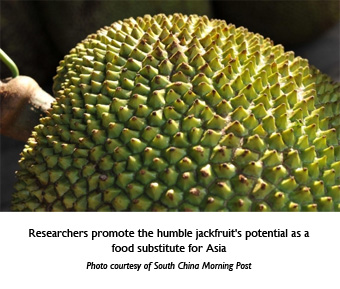It’s big and bumpy with a gooey interior and a powerful smell of decay, but it could help keep millions of people from hunger.
 Researchers say the jackfruit – a large ungainly fruit grown across southern and southeast Asia – could substitute for wheat, corn and other staple crops under threat from climate change.
Researchers say the jackfruit – a large ungainly fruit grown across southern and southeast Asia – could substitute for wheat, corn and other staple crops under threat from climate change.
The World Bank and UN warned recently that rising temperatures and unpredictable rainfall already had reduced yields of wheat and corn, and could lead to food wars within the decade.
Now researchers say jackfruit could help provide the solution.
It is the largest known tree-borne fruit. Superficially similar to the unrelated durian, even a small jackfruit weighs about 5kg to 7kg, and farmers have recorded fruit of more than 45kg.
“It’s a miracle. It can provide so many nutrients and calories, everything,” said Shyamala Reddy, a biotechnology researcher at the University of Agriculture Sciences in Bangalore, India. “If you just eat 10 or 12 bulbs of this fruit, you don’t need food for another half a day.”
But jackfruit, despite its huge potential, remains underexploited as a food crop in India, where it originated. That is beginning to change, however, with a growing number of researchers looking for alternatives.
Next month, Reddy’s university will host an international conference on jackfruit. She said the Indian government had launched several initiatives to promote the crop by expanding its use as a canned vegetable and as a processed food.
The effort coincides with a global push to expand food production, especially in developing countries which are expected to face growing challenges to feed their people.
Jackfruit can fill the gap on a number of counts, said Danielle Nierenberg, president of Food Tank, which works on sustainable agriculture. “It is easy to grow. It survives pests and diseases and high temperatures. It is drought-resistant,” she said.
Reddy said the fruit was rich in potassium, calcium, and iron.
Sri Lanka and Vietnam have jackfruit industries, where the fruit is processed into products as diverse as flour, noodles and ice cream. It is also canned and sold as a vegetable for export.
Source: South China Morning Post
